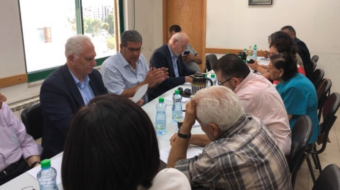
Poland: Symbols outlawed
President Lech Kaczynski this week approved hate crime legislation criminalizing “production, distribution, sale or possession” of communist – and fascist – symbols. Flaunting a red star or a Che Guevara tee shirt could lead to fines or two years in prison. Jaroslaw Kaczynski, head of the Law and Justice Party, called for banning communist artifacts as “symbols of a genocidal system that should be compared to German Nazism.” Leftists and others who support democracy and truth take comfort from invalidation last year by the European Court of Human Rights of similar Hungarian legislation passed in 1994. Equating communists to fascists is the “Big Lie,” they say.
Honduras: Business as usual
Harris Corporation, a multinational, Florida based information technology company – with $5 billion in annual income – last week secured a $38 million, five year contract to run U.S. military “command, control, communications, and computer” systems at the Soto Cano Air Base in Honduras. Harris operations will be supporting the command structure for all U. S. military operations in Central America, in the process “advancing new visions of the U.S. Government…reducing sources of conflict … and promoting partnership.” “Initiatives to thwart narcotics trafficking and other transnational threats” are contemplated. Analyst Arnold August writing on globalresearch.ca, suggests that despite popular resistance against the June 28 right wing coup and struggle for a constituent assembly, “for imperialism, it is business as usual.”
Palestine: Unions reassert support for boycott
The British-based Jewish Chronicle last month threw the Boycott, Divestment, and Sanctions Movement into turmoil when it reported the Palestinian General Federation of Trade Unions no longer supported the boycott movement, which it had backed since its formation in 2005. BDS leaders sought clarification from union leaders from across the Palestinian political spectrum. All three Palestinian labor federations promptly reaffirmed their support: PGFTU -Gaza and six subsidiary PGFTU unions; the Palestinian Federation of Independent Trade Unions; the General Union of Palestinian Workers, Palestine’s largest labor federation. A statement on bdsmovement.net applauds “the spectacular growth of the BDS movement, particularly among major international trade unions” in South Africa, Great Britain, Ireland, Brazil, Canada and France.
Nigeria: Rice contamination, corporate control
Greenpeace reported recently that German-based Bayer Company is campaigning to disseminate its LL62 rice product throughout the global south. Bayer, with global sales totaling $46.3 billion in 2008, modified LL62 to survive its herbicide product Glufosinate, sales of which skyrocket once LL62 takes root. Environmental Rights Action recently did tests documenting contamination by the engineered Bayer rice in Nigerian and Ghanaian seed rice imports. ERA Executive Director Nnimmo Bassey announced corroboration of the findings in a U.S. court last month, when producers charged LL62 contamination of their plantings. Bassey castigated the government for not providing advisories, according to the Umoya.org report. Glufosinate poses a serious human toxicity threat, Greenpeace charges.
Malaysia: Socialists map course
The annual conference organized last month by the Socialist Party of Malaysia (PSM) attracted 200 people for discussions on opposition prospects. In an “electoral tsunami” last year the Peoples Alliance Party won five out of 13 states, and the PSM, founded in 1998 and allowed to register as a party only last year, took one seat in Parliament. Party membership grew 400 percent between 2003 and 2008. The PSM’s seven-point manifesto, accessible on its web site, parti-sosialis.org, opposes neo-liberal policies, “free trade” agreements, corruption, and racial and religious discrimination, while defending worker rights, adequate housing and the environment.
Cuba: Defense exercises take place
The fifth “Exercise Bastion” since 1980 ended on Nov. 29, Cuba’s National Day of Defense. The exercises this year were remarkable for focus on economic and social chaos as a prelude to enemy attacks. Personnel took part from military command and control structures and the Interior Ministry. Response to presumed enemy subversion and destabilization efforts consumed two days. A third day was taken up by defending against hypothetical enemy air and naval attacks, reported La Jornada.
Cubadebate took the occasion to survey U.S. security analysts’ views as to threats posed by Cuba. They include terrorism, cyber-terrorism, biological terrorism and uncontrolled migration.
Photo: Poland’s Coat of Arms.












Comments